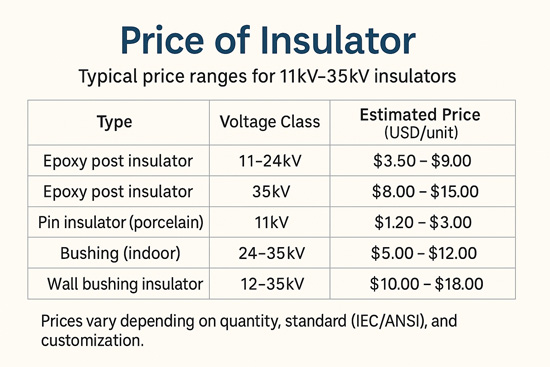When sourcing electrical insulators, especially for 11kV–35kV systems, one of the first questions buyers ask is: What’s the typical price range? The price of insulator varies based on type, material, standard, and application—but there are benchmarks that help guide realistic expectations.
Based on current export and domestic data, typical insulator pricing falls roughly into these brackets:
Type Voltage Class Estimated Price (USD/unit)

These prices typically apply to:
Batch orders of 100–1000 pcs
Standard interface sizes
Neutral packaging without branding
1、Material – Epoxy costs more than porcelain, but offers better tracking resistance
2、Creepage & mechanical rating – More demanding specs mean more resin, larger molds
3、Testing & Certification – Type test reports, batch testing add value (and cost)
4、Order size & frequency – Repeated projects or bulk orders benefit from lower per-unit cost
Before choosing based solely on cost, ask:
·Is the supplier experienced with my country’s standards (e.g. IEC 60060, IEC 60273)?
·Do they offer drawings and tolerances?
·Is repeatability consistent for phased deliveries?
·What’s the lead time in peak season?
PUTAI Electric, a China-based insulator manufacturer, offers epoxy and composite insulators with stable pricing and reliable delivery. Many customers in Southeast Asia, Africa, and Eastern Europe choose PUTAI when balancing performance vs. price. Their products are batch-tested and suitable for OEMs and infrastructure tenders.